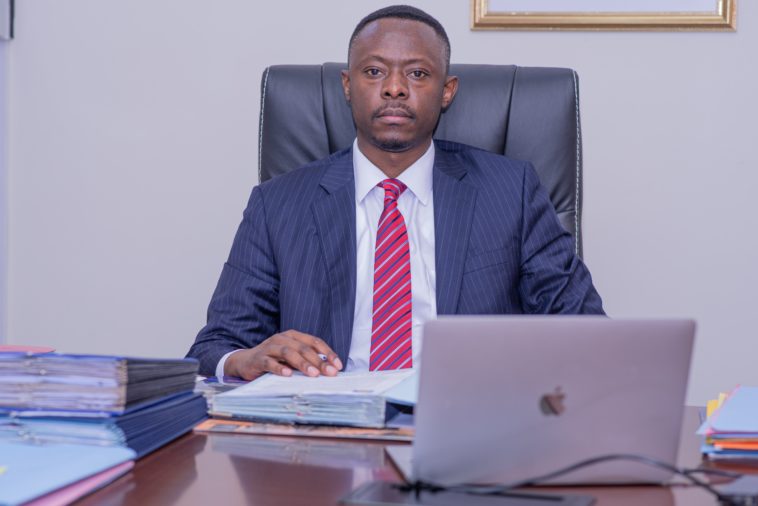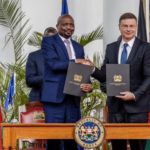Teddy Lwamba Muba, who holds a PhD in electrical engineering and is an electromechanical engineer by training, was appointed Deputy Managing Director of Société Nationale d’Électricité (SNEL) in October 2022 to turn around the Congolese national electricity company, and has been acting Managing Director since April 2023. He has over 12 years’ experience as a senior executive in the electricity sector in the Democratic Republic of Congo, Africa and several European and Asian countries. During a lengthy interview, he shared his vision for the mission entrusted to him.
Teddy Lwamba began his career in 2011 as head of the electricity and instrumentation department at SEK (Société d’exploitation de Kipoi), a metallurgical plant with a copper concentrator. He was subsequently appointed Project Coordinator for the Luena Thermal Power Plant in 2013, as part of the Gécamines/CTL project, in charge of carrying out feasibility studies for a 500 MW thermal power plant. A few years later, he was entrusted with the management of the Project in charge of the design and execution of major electrical infrastructure works in Botswana, Uganda, India, Bulgaria, Italy and Cyprus.
Teddy Lwamba is also a member of the IEEE (Institute of Electrical and Electronics Engineers), Europe Zone, and author of several scientific works.
Hello, Mr Lwamba Muba. Could you please introduce yourself?
I’m Teddy LWAMBA MUBA, Doctor of Electrical Engineering and originally an electromechanical engineer. I have an international career spanning almost twelve years in consulting and project management in the electricity sector. In 2011, I began my professional career at Société d’Exploitation de Kipoi, which at the time was a copper concentrator, and which also boasted a solvent extraction metallurgical industry a few years later. After two years there, I decided to continue my master’s degree. On my return, I was recruited as project coordinator for the Luena power plant, a Gécamines project to build a 500-megawatt coal-fired power plant in Haut-Lomami. The project was finalized, but unfortunately it didn’t come to fruition.
I decided to continue my career in Europe, particularly in Cyprus. I worked for several years in a design office that took me to Botswana, Uganda, India several times, and other African countries.
These experiences really gave me a taste for, and a passion for, developing ambitious infrastructure projects in the power sector in Africa.
Today, I’m a member of the IEEE Europe Zone in Cyprus, with expertise in smart grid design and energy recovery. I have written several scientific works on smart grids and waste-to-energy conversion. I have coordinated several international projects involving the construction of substations, substations and power plants.
What is your background?
I joined SNEL through a competitive examination organized by COPIREP on the recommendation of the World Bank, which had asked the Congolese government to recruit public officials through a competitive examination to ensure that they had the right skills to manage the few companies in the state portfolio. It was on the basis of this competition that I was recruited as Deputy General Manager of SNEL SA in October 2022. The competition was based on the presentation of an action plan that was defended. It took almost four months from the submission of the application, to the first screening operations, to the interview tests. At the end of the test, I was appointed Deputy Managing Director of SNEL by presidential decree.
You’ve been acting CEO of SNEL since April 2023. What difficulties have you encountered?
SNEL’s corporate purpose, which is the production, transport, distribution and marketing of electrical energy, is fraught with problems. But before we can resolve the problems that affect our core business, we must first resolve certain structural problems that affect the company upstream. These structural problems are as follows:
– While praising the Congolese government’s efforts to revise the tariff, the administered tariff system is a thorny problem. Since SNEL SA is unable to set its own prices, it does not live the truth about prices, and some items in the price structure, notably certain non-tax taxes, are not included. As a result, SNEL finds itself paying certain taxes that are not covered in the price, and is thus undergoing a net decapitalization.
– Fiscal pressure from mobilizers, and the ATD notices (avis à tiers détenteurs) which are everywhere around, hinder the smooth running of the company at times;
– The cumbersome and non-competitive nature of the law on public procurement, sometimes resulting from the length of time it takes to obtain notices of non-objection in good time, blocks the acquisition of stock materials in good time;
– The long sales cycle makes the company dependent on lines of credit to cover certain incompressible expenses;
– The production capacity is lower than the demand, around 2800 MW of installed capacity for 4500 MW of demand, the balance being totally in deficit;
– The transmission sector, with 109 existing high-voltage sections and 11 unavailable, following the theft of copper conductors from SNEL SA’s Réseau-Sud network,
– Distribution suffers from insufficient substations, fraudulent connections and high technical losses due to the dilapidated state of the network in most neighborhoods;
– The commercial sector suffers from insufficient metering to better quantify the energy sold, etc.
– Human resources, with a job occupancy rate of around 50%, 66% of whom are over 51 years old.
What can be done to overcome these difficulties?
– A request to develop a mechanism for the joint settlement of SNEL’s debts with the financial authorities, involving a request for the ex gratia remission of penalties owed to the latter;
– The activation of an approach aimed at soliciting tax relief in the short term, which suggests the introduction of a reduced VAT adapted to SNEL SA’s circumstances;
– SNEL has had a procurement plan in place, enabling it to build up its stock of spare parts legally for over 13 years. The CGPMP procurement unit was also created;
– Implementation of our network development master plan, for which the terms of reference have already been drawn up for the recruitment of a firm. The master plan will guide SNEL’s development over the next twenty years;
– To make up for the shortfall in production, a plan has been drawn up to empower official bodies with a photovoltaic system. Over 350 MW will be recovered, boosting the Congolese industrial and mining sector;
– The gradual replacement of copper conductors with alac to reduce theft and avoid blackouts;
– The introduction of a remote meter reading system will reduce the length of the commercial cycle, which has already begun;
– The fight against black pockets by installing new transformers in urban networks;
– etc.
BOX
Teddy Lwamba Muba, Acting Managing Director of SNEL
– Appointed Deputy Managing Director of Société Nationale d’Electricité in 2022 by the President of the Republic, Félix Tshisekedi, he has been acting Managing Director since April 2023;
– Doctorate in Electrical Engineering (PhD) and Electromechanical Engineer with 12 years’ experience in the electricity sector in the DRC and internationally, in Botswana, Uganda, India, Bulgaria, Italy and Cyprus.
– Project Coordinator for the Luena Thermal Power Plant in 2013
– Member of the IEEE (Institute of Electrical and Electronics Engineers), Europe Zone.
– Electrical and Instrumentation Department Manager at Kipoi Operating Company in 2011





